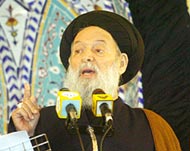Shia hit back at Mubarak
Clerics and politicians in Kuwait and Lebanon have rebuked the Egyptian president for saying that Shia Muslims gave their primary loyalty to Iran.

Ayatollah Mohammed Baqer al-Muhri told The Associated Press: “We ask the Kuwaiti government to react in a suitable way to the Egyptian president and to explain the truth.”
People in the area have to know that Hosni Mubarak’s remarks were “wrong and did not reflect the truth”, said al-Muhri, who heads the Congregation of Muslim Shia Olama in Kuwait, where Shia make up about 30% of the population of nearly a million.
Al-Muhri said religious ties do not affect national loyalties, pointing out that during the 1980-88 war between Iraq and Iran, many Iraqi Shia fought Iranian Shia.
“We don’t need any certificates of allegiance to our country,” al-Muhri said.
Criticism
|
“Definitely Iran has influence on Shia. [They] are 65 percent of the Iraqis … Most of the Shia are loyal to Iran, and not to the countries they are living in” Hosni Mubarak, Egyptian president |
In an open letter to Mubarak in the Kuwaiti newspaper Al-Watan, Kamal Edin Mirza al-Ihqaqi, a Shia cleric and legislator, said that if the Egyptian president believed what he said, “does this mean that the loyalty of Christians in Egypt or Lebanon or anywhere else is to the Vatican?”
Grand Ayatollah Mohammed Hussein Fadlallah, Lebanon’s most senior Shia cleric, described Mubarak’s comment as dangerous and inaccurate.
Shia Muslims form the biggest sect in Lebanon, numbering about 1.2 million in a population estimated at 3.5 million. The two largest Shia parties in Lebanon, Hezbollah and Amal, called on Mubarak to issue a correction.
Hezbollah and Amal, in a joint statement on Monday, said: “The Shia of Lebanon have proven their nationalism, credibility and loyalty to their country and people by their sacrifices, blood and efforts exerted. We hope that the Egyptian presidency will correct the impression it gave because of its stature in the Arab world.”
Controversial comments
 |
|
Fadlallah, Lebanon’s Shia leader, |
In an interview broadcast on Saturday, Mubarak told Arab news channel Al-Arabiya: “Definitely Iran has influence on Shia. [They] are 65% of the Iraqis … Most of the Shia are loyal to Iran, and not to the countries they are living in.”
Iraqi leaders also criticised the remark. Jalal Talabani, a Muslim Kurd and Iraq’s president, joined Adnan Pachachi, a Sunni Muslim and parliament speaker, and Ibrahim al-Jaafari, a Shia Muslim and prime minister, in issuing a statement that called Mubarak’s comment a “stab” at Iraqi Shia patriotism.
Three Kuwaiti Shia legislators told a press conference on Sunday that Mubarak should apologise for the remark.
Suleiman Awad, Mubarak’s spokesman, tried to soften the remark’s impact by saying the president was talking about Shia sympathy with Iran “in view of its hosting of [Shia] holy shrines”.